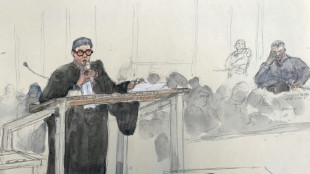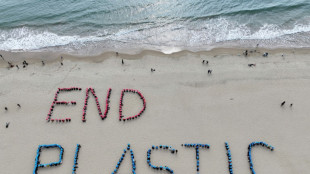
-
 Coffee price heats up on tight Brazil crop fears
Coffee price heats up on tight Brazil crop fears
-
Maeda salvages Celtic draw against Club Brugge

-
 Villa denied late winner against Juventus
Villa denied late winner against Juventus
-
Dortmund beat Zagreb to climb into Champions League top four

-
 Mbappe misses penalty as Liverpool exact revenge on Real Madrid
Mbappe misses penalty as Liverpool exact revenge on Real Madrid
-
Brazil's top court takes on regulation of social media

-
 Thousands still queuing to vote after Namibia polls close
Thousands still queuing to vote after Namibia polls close
-
Trump taps retired general for key Ukraine conflict role

-
 Canadian fund drops bid for Spanish pharma firm Grifols
Canadian fund drops bid for Spanish pharma firm Grifols
-
Argentine ex-president Fernandez gives statement in corruption case

-
 Mexico says Trump tariffs would cost 400,000 US jobs
Mexico says Trump tariffs would cost 400,000 US jobs
-
Car-centric Saudi to open first part of Riyadh Metro

-
 Brussels, not Paris, will decide EU-Mercosur trade deal: Lula
Brussels, not Paris, will decide EU-Mercosur trade deal: Lula
-
Faeces, vomit offer clues to how dinosaurs rose to rule Earth

-
 Ruby slippers from 'The Wizard of Oz' up for auction
Ruby slippers from 'The Wizard of Oz' up for auction
-
Spain factory explosion kills three, injures seven

-
 US Fed's favored inflation gauge ticks up in October
US Fed's favored inflation gauge ticks up in October
-
Defence lawyers plead to judges in French mass rape trial

-
 US says China releases three 'wrongfully detained' Americans
US says China releases three 'wrongfully detained' Americans
-
New clashes in Mozambique as two reported killed

-
 Romania officials to meet over 'cyber risks' to elections
Romania officials to meet over 'cyber risks' to elections
-
Chelsea visit next stop in Heidenheim's 'unthinkable' rise

-
 Former England prop Marler announces retirement from rugby
Former England prop Marler announces retirement from rugby
-
Kumara gives Sri Lanka edge on rain-hit day against South Africa

-
 Namibia votes with ruling party facing toughest race yet
Namibia votes with ruling party facing toughest race yet
-
Spurs goalkeeper Vicario out for 'months' with broken ankle

-
 Moscow expels German journalists, Berlin denies closing Russia TV bureau
Moscow expels German journalists, Berlin denies closing Russia TV bureau
-
Spain govt defends flood response and offers new aid

-
 France says Netanyahu has 'immunity' from ICC warrants
France says Netanyahu has 'immunity' from ICC warrants
-
Nigerian state visit signals shift in France's Africa strategy

-
 Stock markets waver as traders weigh Trump tariffs, inflation
Stock markets waver as traders weigh Trump tariffs, inflation
-
Tens of thousands in Lebanon head home as Israel-Hezbollah truce takes hold

-
 Opposition candidates killed in Tanzania local election
Opposition candidates killed in Tanzania local election
-
Amorim eyes victory in first Man Utd home game to kickstart new era

-
 Fresh fury as Mozambique police mow down protester
Fresh fury as Mozambique police mow down protester
-
Defeat at Liverpool could end Man City title hopes, says Gundogan

-
 Indonesians vote in regional election seen as test for Prabowo
Indonesians vote in regional election seen as test for Prabowo
-
Guardiola says no intent to 'make light' of self harm in post-match comments

-
 New EU commission gets green light to launch defence, economy push
New EU commission gets green light to launch defence, economy push
-
Opposition figures killed as Tanzania holds local election

-
 Taiwan Olympic boxing champion quits event after gender questions
Taiwan Olympic boxing champion quits event after gender questions
-
European stocks drop on Trump trade war worries

-
 Volkswagen to sell operations in China's Xinjiang
Volkswagen to sell operations in China's Xinjiang
-
FA probes referee David Coote over betting claim

-
 Serbia gripped by TV series about murder of prime minister
Serbia gripped by TV series about murder of prime minister
-
Putin seeks to shore up ties on visit to 'friendly' Kazakhstan

-
 New EU commission pushes for defence and economy spending
New EU commission pushes for defence and economy spending
-
Plastic pollution talks must speed up, chair warns

-
 Pakistan web controls quash dissent and potential
Pakistan web controls quash dissent and potential
-
1,000 Pakistan protesters arrested in pro-Khan capital march


Georgian fighters in Ukraine wrestle with international humanitarian law
His forearm tattooed "Never forget, never forgive," the head of the Georgian National Legion Mamuka Mamulashvili listens intently to a presentation on the need for fighters in Ukraine to respect international humanitarian law.
The event in the capital Kyiv is organised by a Swiss NGO called Geneva Call as part of its efforts to meet and provide guidance to a wide range of Ukrainian combatants.
As fighting rages, Geneva Call aims to impartially convey the rules of international combat to fighters who may have had little or no training, says Marie Lequin, head of its Eurasia region.
Held in an office centre with PowerPoint screens, the setting contrasts sharply with the battle-hardened appearance of the Georgian Legion fighters.
A fluent English speaker, Mamulashvili, who is Georgian, leads around 800 fighters from some 32 countries, fighting in southeastern Ukraine.
The Legion boasts that it recruits only volunteers with combat experience and so far has suffered injuries but no deaths.
Squadron leaders, mostly bearded and tattooed, flank him at the session in Kyiv.
Issues such as prisoners of war and rules on proportionality are covered. Other topics include whether to give relatives details on how a soldier died -- not necessarily -- and whether the conflict is legally defined as "international" -- it is.
Finally, the participants sign an undertaking to observe international norms, posing with their flag decorated with a red-eyed wolf.
"Today it's one step in a process we call humanitarian engagement... setting up a kind of dialogue with armed organisations to leverage some kind of change in policy and behaviour," Lequin tells AFP.
- 'Blurred lines' -
The treatment of civilians and human rights organisations prompts much discussion at the presentation.
Warning of potential "blurred lines" in the war, Lequin stresses that "it's important that humanitarian work, assistance, is separated from military operations".
But Mamulashvili counters that humanitarian organisations "should be more involved in the process and not stop at lectures".
He insists that his fighters "are getting the basic information about the Geneva Convention and different international laws that they should be aware of".
The Legion at the end of the session signed a commitment to protect the civilian population and allow access to humanitarian groups.
At the same time, he says the Legion carries out some humanitarian activities itself due to a lack of NGOs on the ground.
"We were transporting civilians from areas that have been shelled by Russians," he tells the session.
"We are doing it with cars that we bought with our own money and they're not armoured and it's quite dangerous for civilians."
Geneva Call says that if an armed group carries out a humanitarian aid distribution or evacuation, or accompanies humanitarian groups, it must ditch uniforms and not carry weapons while doing so.
"We don't carry arms with us when we distribute to volunteers the humanitarian aid," branch commander Taras Reshetylo tells AFP.
- 'Let's be models' -
Lequin warns that such well-intentioned actions can put civilians in danger by making them a potential target.
"It's confusing from a civilian perspective to understand if you are providing humanitarian assistance or if you are leading military operations to protect civilians," she tells Mamulashvili.
For NGOs, too, "it's very difficult to assess whether the military presence will turn us into a military objective or not," she adds.
Actions can be interpreted differently, or manipulated, Lequin tells AFP, adding that the conduct of war "will end up in court at some stage and it's important that we can document all this".
She urges Mamulashvili: "Let's be models and let's have the best practice."
- 'Grave violation' -
Some Ukrainian fighters in the war-torn east have used schools to accommodate soldiers and transported troops in yellow school buses, AFP journalists have seen -- making these potential targets.
"We have never used schools and I'm sure that Ukrainians are also not violating international law," Mamulashvili tells AFP.
But Russia, he claims, is "breaking all the rules" and he accuses it of using fake humanitarian aid organisations as covert means to bring in weapons.
Lequin says that this would be a "grave violation" and "perfidy".
Mamulashvili says the Legion, which carries out special operations, has units "spread everywhere on the front line".
"It is becoming heavier for us because Russia is not getting into contact fights anymore and they are only shooting artillery," he says, stressing Ukraine's need for more rocket systems to respond.
"Ukraine needs to protect its civilian population that is bombed daily and we have nothing to answer with," he warns.
Y.Bouchard--BTB
